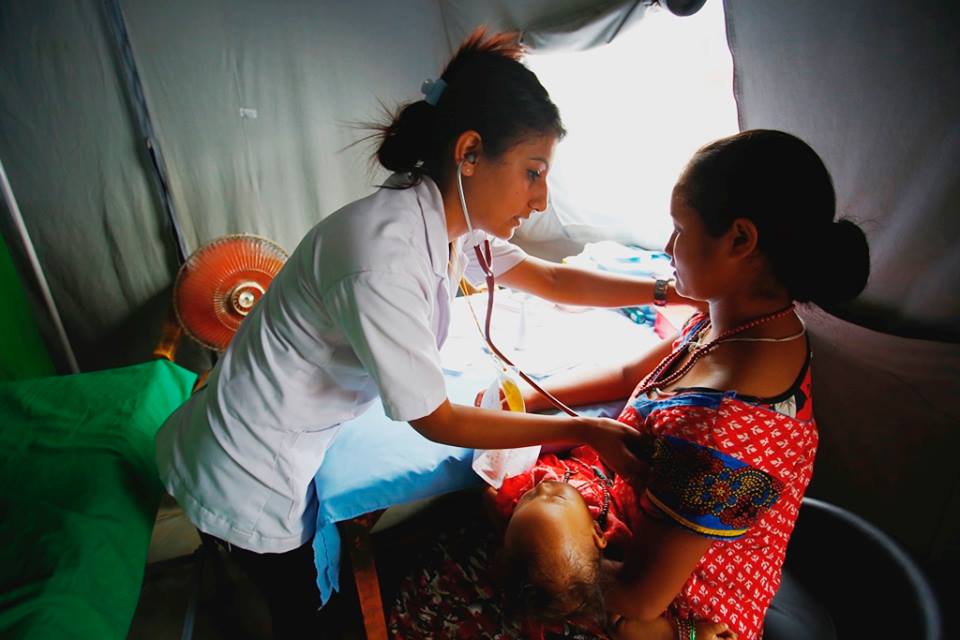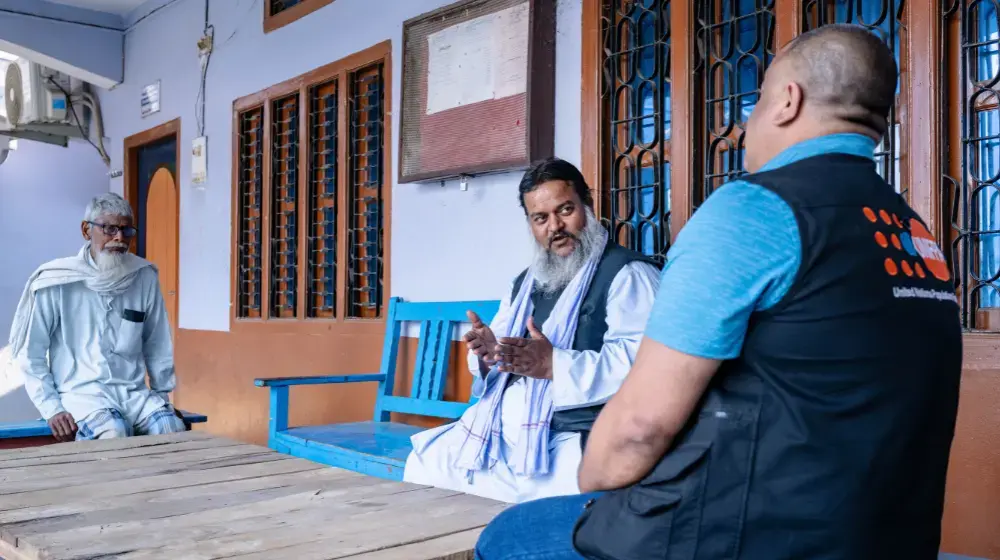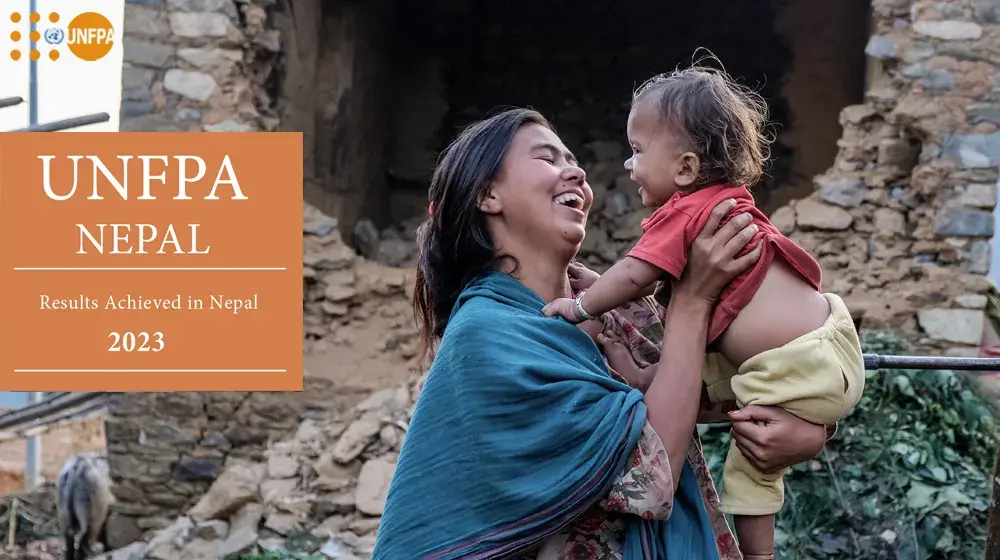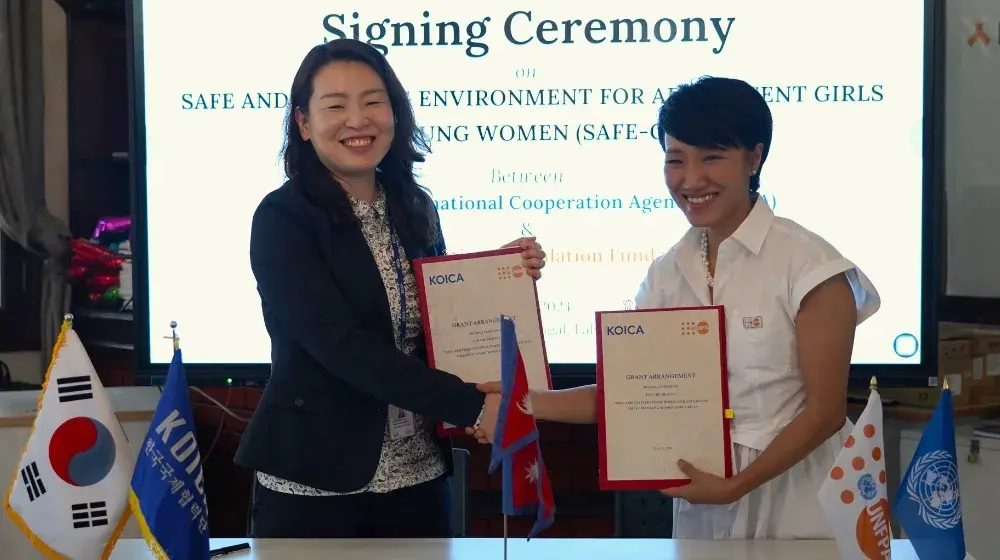It is a grim reality that the risk of sexual assault, coercion and exploitation escalates whenever the social order breaks down or populations are displaced.
By Giulia Vallese, UNFPA Representative for Nepal, and Anjali Sen, Regional Director, South Asia Region, IPPF
On April 25, 2015, Nepal was struck by its worst earthquake in nearly a century. Measuring 7.8 on the Richter scale, the quake destroyed nearly 600,000 and damaged almost 300,000 homes, and displaced some 2.8 million people. More than 8,800 people were killed; tens of thousands were injured. Powerful aftershocks have compounded the devastation.
Everyone understands that in a humanitarian crisis of this nature, there is an urgent need for food, water, shelter, and basic first aid. But what is perhaps less obvious is that there is also an urgent need to provide life-saving reproductive health services and to prevent and respond to gender-based violence.
Women and girls in crisis situations face special perils. Pregnant women need ante-natal care, a clean, safe place to give birth and medical attention in the event of complications. New mothers need vital nutrients and postpartum care. And women and girls of all ages need protection from gender-based violence, including sexual violence, which tragically follows in the wake of most humanitarian crises.
It is a grim reality that the risk of sexual assault, coercion and exploitation escalates whenever the social order breaks down or populations are displaced. Temporary camps can be danger zones, with women and girls at risk of being assaulted when they are alone in the camps or when they go to fetch water or visit the latrines. Crowding and lack of privacy are rife. Sometimes women are coerced by those in charge to provide sex in exchange for food and other essentials. Without access to reproductive healthcare, including contraception, women and girls are vulnerable to unplanned pregnancy and HIV transmission.
In the immediate aftermath of the Nepal earthquake, it was estimated that 1.5 million women and girls of reproductive age were affected in the 14 most affected districts. Approximately 93,000 of these women were pregnant and more than 10,000 were likely to give birth each month, with almost 1,500 developing obstetric complications. Another 28,000 were believed to be at immediate risk of sexual violence.
What is at stake for these women and girls is the fundamental right to freely make informed decisions regarding their reproductive health and having the means to do so. Family Planning 2020 refers to this as the principle of Agency and Autonomy, and it is a cornerstone of rights-based reproductive healthcare. FP2020's Rights & Empowerment Principles for Family Planning defines it this way:
Agency and Autonomy: Individuals have the ability to decide freely the number and spacing of their children. To exercise this ability, individuals must be able to choose a contraceptive method voluntarily, free of discrimination, coercion or violence.
In Nepal, the United Nations Population Fund (UNFPA) and the International Planned Parenthood Federation (IPPF) have been supporting the government of Nepal to ensure women and girls have access to emergency reproductive health care in the regions hardest hit by the earthquake. UNFPA is the UN agency co-leading the reproductive health and gender-based violence sub-clusters with the Ministry of Health and Population, and Ministry of Women, Children and Social Welfare respectively, thus supporting the government with coordinating reproductive health services and helping to prevent and respond to gender-based violence in the crisis. IPPF is operating through its SPRINT Initiative (Sexual and Reproductive Health Programme in Crisis and Post-Crisis Situations), a global emergency response program funded by the Australian government and implemented by its member association, Family Planning Association of Nepal.
Within days of the earthquake, UNFPA and IPPF were on the ground delivering emergency services and setting up mobile reproductive health camps and Female Friendly Services (FFS). UNFPA-supported FFS are safe spaces for women and girls in the community, culturally-appropriate and tailored to the context. They offer a range of services including resources, information, social networks and psychosocial counseling and appropriate referrals. Women and girls can go there at any time to feel safe and empowered and have access to information, education, recreational activities, support and services.
Mobile health camps - run in affected districts in close coordination with local health authorities and local community hospitals and international nongovernmental organizations - provide a safe place where women and girls in remote communities can access basic health care, contraceptives, pre and postnatal care, psycho-social support including counseling for sexual violence, testing and treatment for HIV and other sexually transmitted infections and hospital referrals for emergency obstetric care.
Camp personnel were introduced to the Minimum Initial Service Package (MISP), which is the international standard of care for reproductive health in emergencies. They were sensitized on gender-based violence and oriented on the clinical management of rape. For women and girls suffering in a humanitarian disaster, it can mean the difference between life and death.

UNFPA is rehabilitating damaged birthing centers and providing tents, delivery tables and Emergency Reproductive Health Kits, which are pre-assembled packages containing essential drugs, supplies and equipment. They include a variety of contraceptive methods, post-rape kits, clean delivery kits and supplies and equipment for referral hospitals to prevent maternal and newborn mortality, reduce transmission of HIV and prevent sexual violence and assist survivors. UNFPA also distributes individual Dignity Kits, which contain the items each woman or girl needs to maintain personal hygiene and safety: clothes, reusable sanitary pads, underwear, towel, soap, a toothbrush and toothpaste, nail cutter and flashlight. The kits were distributed to several district hospitals, health facilities, reproductive health camps and to other partners to ensure availability of reproductive health services throughout the most affected districts.
The crisis in Nepal is far from over. Monsoon season is in full swing, landslides and aftershocks are regular occurrences, and human traffickers are targeting the region to abduct vulnerable women and girls. In many ways the dangers are as great as ever.
But UNFPA and IPPF are joining efforts to mitigate those dangers and make sure that women and girls have access to the reproductive services they need.
At the time of writing of this report, 68 mobile reproductive health camps have reached more than 39,000 beneficiaries. Additionally, 14 transition home and 12 FFS have been established providing support to nearly 3,000 women and girls. Twenty-one GBV survivors have been provided with immediate care and referred for various services.




